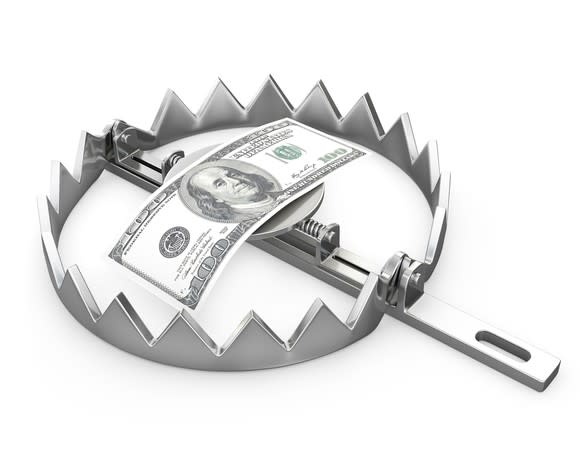3 Under-the-Radar Stories in the Stock Market This Week
If you're trying to beat the market, you need to develop a variant perception -- a strong viewpoint that differs from the market consensus. To do that, you need to focus on situations or information that the consensus view is under-weighting or ignoring altogether.
This week, we look at why an optimistic forecast for U.S. stocks is sobering, why Citigroup Inc.'s (NYSE: C) $18.3 billion quarterly loss doesn't matter, and why a story related to high-profile investor Bill Ackman has gained little traction.

Image source: Getty Images.
Stocks: You'll be lucky to earn 6%

Source: Getty Images.
The S&P 500 (SNPINDEX: ^GSPC) closed at another record high on Friday. Meanwhile, financial blogger Jesse Livermore published a new post at the start of the week that outlines his best case for future U.S. equity returns.
His forecast is sobering, and it's worth considering: Livermore doesn't publish under a prestigious masthead or on behalf of a fancy investment firm, but he has arguably the best understanding of equity market returns of anyone out there, with the possible exception of Bradford Cornell at Caltech.
Instead of going down the rabbit hole concerning whether stocks are overvalued, Livermore adopts a set of assumptions that are "maximally conservative, granting every optimistic assumption that a bullish investor could reasonably request." Under that framework, Livermore calculates an upper limit for the long-term total return on stocks of 5.95%, on an annualized basis. That's roughly 3 full percentage points lower than the average annual return that stocks have delivered historically.
If, as Livermore says, "long-term future U.S. equity returns are almost guaranteed to fall substantially short of the [average] 7.5% pension fund target," it ought to give pause to all of us saving for retirement. Investors obsess over the possibility of a financial crash, but there are less spectacular paths to missed retirement goals.
If you have some background in finance or economics, it's worth reading the entire blog post. Be warned, however: At nearly 4,000 words, it can't be consumed like a tweet.

Source: Getty Images.
Citigroup: The $18 billion loss clouding fair weather ahead
With the broad market set to produce disappointing long-term returns, stock-picking is one possible strategy to try to achieve superior results. On that note, Citigroup reported its fourth-quarter earnings on Tuesday, and the headline figures -- an $18.3 billion loss resulting from a $22 billion charge related to changes in the tax code -- attracted a lot of attention. The headline in The Wall Street Journal, for example, proclaimed: "Citigroup Earnings Wiped Out by Tax Charge." While that headline is factually accurate, it does a poor job of summing up the situation regarding the one-time, non-cash charge.
The story behind the charge is that Citigroup's deferred tax assets, the result of gargantuan crisis-era losses, are becoming less valuable under a lower tax rate. As Morningstar's Jim Sinegal explained, "The change is an overall positive for the company, as future cash flows will increase in perpetuity under the lower tax regime."
Andrew Barry of Barron's was more illuminating in his article, "Citi's Huge Buyback Program Is Paying Off." Emphasis is mine.
The bank is expected to return $18.9 billion to holders in buybacks and dividends in the year ending in June -- over 100% of net income -- and over $60 billion in the next three years. This highlights the willingness of regulators to allow large capital returns to big banks like Citi amid comfort with their capital levels.
[Wells Fargo analyst Mike] Mayo wrote that Citi's shares are "undervalued" but noted that the bank "continues to have worst-in-class returns," including a 2017 return on assets of 0.84%. And its returns on tangible common equity remains low at 8.1%, or 9.6% excluding deferred tax assets.
The low returns are a key reason that Citi remains among the cheapest of the major banks, trading for 1.3 times its tangible book value.
In other words, if Citi can maintain its return on equity at its 2017 level, it will be earning on behalf of its shareholders several percentage points more than a "maximally conservative" return forecast for the broad market. And that doesn't account for the possibility of further operational improvements at the bank or an upward revaluation in the stock.
Bill Ackman: Too clever by half

Source: Getty Images.
Photogenic and eloquent, activist investor Bill Ackman, head of Pershing Square Capital Management, is a media darling. However, there was comparatively little attention paid to Pershing Square's revised tender offer for shares of Pershing Square Holdings Ltd. On Jan. 16, shares of the closed-end fund, which are listed in London and Amsterdam, closed at a 20% discount to their net asset value -- the value of the investments held in the fund.
This topic is more technical and less "sexy" than a high-profile clash with a company's management, and that alone may explain the lack of coverage. But the Financial Times weighed in (subscription required):
Mr. Ackman's position nevertheless looks uncomfortable. A champion of shareholder rights should be beyond reproach in his treatment of his own shareholders. That is not consistent with getting a board waiver to breach a 4.9% ownership limit, even if other investors can apply as well.
Mr. Ackman has, meanwhile narrowed the price range at which he is willing to buy shares from the market. ... In another concession, there will be a shareholder vote on whether to abolish the 4.9% ownership limit. But this should ideally precede rather than follow the tender.
The row involves mind-bending arguments over price signaling. The lesson is simple: No underperforming boss is immune from shareholder dissent. Activist, heal thyself.
As far as I am concerned, this story harks back to a broader lesson: Never invest in the publicly traded vehicles of financiers -- not as a long-term investment, at any rate. They have an extremely developed sense of their own self-interest and are extremely creative in defending that self-interest. This rule thus excludes investing in investment banks and publicly traded hedge fund and private equity fund managers. The monumental exception that confirms the rule: Warren Buffett's Berkshire Hathaway Inc.
As hedge fund manager and former Goldman Sachs partner Leon Cooperman once said:
We are not an investor in [investment banks]. I determined many years ago that if you want to make money on Wall Street, you work there; you don't invest there. They just pay themselves too well.
It's one of my favorite quotes.
More From The Motley Fool
Alex Dumortier, CFA has no position in any of the stocks mentioned. The Motley Fool owns shares of and recommends Berkshire Hathaway (B shares). The Motley Fool has a disclosure policy.

 Yahoo Finance
Yahoo Finance 